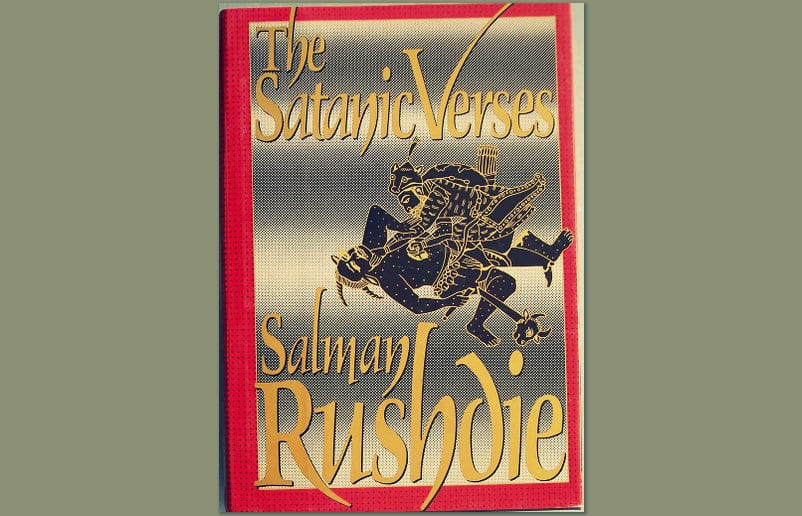
For quite some time I was curious to start this book, considered to be one of the most controversial in history and masterpiece (along with Children of the Midnight) by British writer of Hindu origin Salman Rushdie.
The point is that, once finished, the book has quite a few points to comment on, not only because of its many interpretations or the analyzes that loss of identity in an increasingly globalized world, but also because of the fact that part of the passages from the book sentence Rushdie to hide after putting a price on his head by Ruhollah Khomeini, Ayatollah of Iran in 1988; a sentence that continues in force.
Let's dive into this review of The Satanic Verses of Salman Rushdie.
Magical realism made in India
The satanic verses have as protagonists two hindu characters: Gibreel Farishta, the most famous actor in Bollywood, and Saladin Chamcha, known as the Man of a Thousand Voices for his ability for dubbing and lover of British culture above all else. Both characters meet aboard flight Bostan 706, which explodes over the English Channel due to a terrorist attack.
During the fall, Gibreel begins to suffer hallucinations that connect him in time and space with other settings and characters, specifically, the ancient city of Mecca (here called Jahilia), an area in northern India that begins a pilgrimage led by a believer named Ayesha, or the exile of an Arab leader in London.
After falling on the icy shores of the United Kingdom, both characters separate, plunging into a convulsive London in which Chamcha, the second in disagreement, hides in an Indian cafe when horns begin to sprout from his head and takes on the appearance of himself. Satan.
Both characters meet, get lost and confront each other in a confused and mixed-race London, in which Gibreel and Saladin play the roles of the oldest duel in the world: that of the angel and the devil himself.
The latest book of post-colonialism
I have rarely laughed at a book like this one, especially because of the ironic tone that Rushdie uses throughout the work. And it is that the satanic verses it's not just a book about religion, but also about globalization, loss of identity, love, cultural appropriation and a dormant faith in these times when many of the former colonies of the West (see India) still continue to search for themselves.
In turn, the book denotes an overflowing imagination, not only in its metaphors and style, but also in stories such as those of Rosa Diamond, the Anglo-Argentine who welcomes the protagonists when they fall from the plane, or that pilgrimage led by Ayesha, a girl covered in butterflies who sets out to open the waters of the Arabian Sea in the manner of contemporary Moses.
The only flaw, in my opinion, would be the constant need to introduce characters to describe but they do not contribute much to the plot, which reduces the fluidity of the whole and makes the reading become somewhat heavy in some sections. However, it is a minimal detail compared to all those other virtues of a book that every reader should look at at some point, whether or not they are in favor of Islamism, globalization or any other movement of our time.
Iran didn't like it

Ruhollah Mousavi Khomeini, the Imam of Iran who promoted the hunt for Rushdie after the publication of The Satanic Verses.
The most controversial aspect of The Satanic Verses lies in the visions of the character of Gibreel, alias Archangel Gabriel and present in that interpolarization of the Qur'an that supposes his vision of Jahilia (or Mecca), in which it is suggested that the birth of the Qur'an and the rise to power of the prophet Muhammad it was due to a simple issue of influence peddling. In this way, Muhammad would have turned Jahilia into a playground where no pig was eaten and the women were locked up at home for part of the day.
The second vision, that of the hidden Imam in London, is a direct allusion to the figure of the Ayatollah Ruhollah Mousavi Khomeini, Iranian leader and founder of the Islamic Union of Iran late 70s.
And it was he himself who, after the publication of the book in 1988, issued a fetus (or legal order according to the Iranian government) in which the head of Rushdie and that of everyone involved in the book was requested. In this way, the writer had to remain hidden for several years, although close associates such as Hitoshi Igarashi, the Japanese translator of the book, was assassinated in 1991.
Worst of all, even if Rushdie succumbed to redemption, the fatwa continues to be active according to Iranian authorities. In fact, the price for his head increased to $ 3.3 million in 2016.
When Gabo smells like curry

Despite being born in Bombay in 1947, Rushdie, to Kashmiri parents of Muslim beliefs, was sent to London at the age of 14. After writing the odd little success story, Children of midnight, published in 1980, would become a surprise and a turning point in Hindu-British literature. Booker Prize WinnerHis debut would be followed by other works such as The Satanic Verses or Shalimar the Clown.
In his bibliography I also include some books of stories such as Oriente, Occidente, the first one I read by this author.
Rushdie has been appointed on more than one occasion as the ambassador of the magic realism of india, judging by that fusion of the everyday with the fantastic, in his case with the mythology and mysticism of the Asian subcontinent. An author who has clearly influenced other authors of his time such as Arundhati Roy and his book The God of Small Things, which became the strongest heir to the influence of this author.
The Satanic Verses of Salman Rushdie It is a book that will appeal to those who are especially attracted to society and the world we live in today (things have not changed so much since 1988), at the same time that reading is a walk through these exotic places and more than one controversy vision through those passages of history whose fanaticism we have all witnessed in recent years.
Did you also read The Satanic Verses? What do you think?
apocalypse 17 denounces the seven sudairis
Hello, I came looking for a review of the book to get an idea of what I am going to find and then nothing remains in the same hahahaha ... Anyway, I will start reading and hope to immerse myself to such a degree that it forces me to think a bit different.
Thanks for your input
With all due respect to the author, in the Argentine part there is an error when he mentions that Gibreel "saw Martin Cruz and Aurora del Sol (characters from the pampas) dance flamenco on the roof ... of the Diamond house ...". It must be 'dance milonga', because the entire section writes Argentine peasant customs and it would not even make sense to speak of “flamenco”.
M. Giron. That of mixing music and countries can be compensated.
You just have to write a story about an Indian refugee in Spain, who eats cassava with roasted beef ribs, drinks red wine while listening to some Ukrainian waltzes called kolomeicas